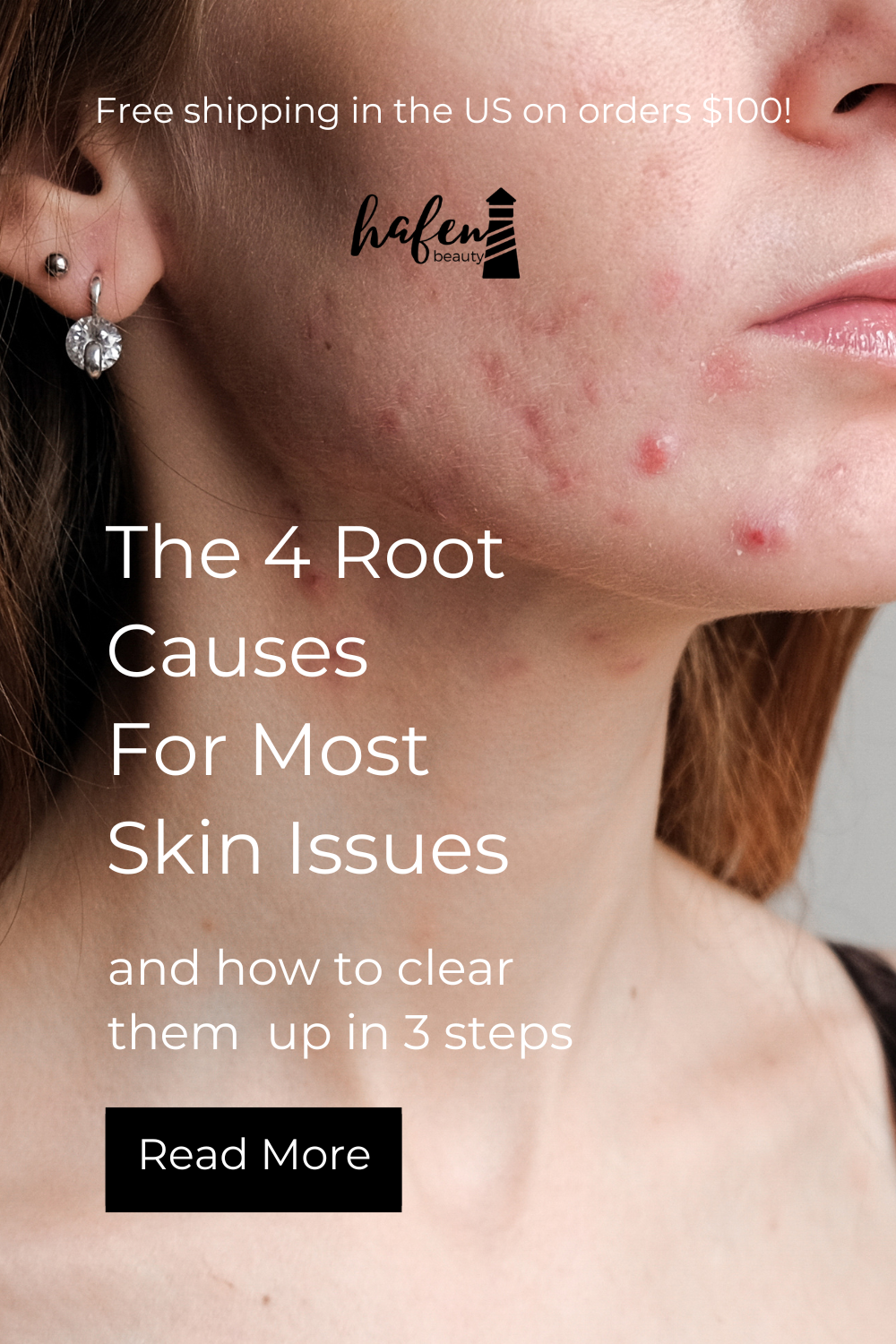Our skin is the largest organ in the human body and plays a crucial role in protecting us from external factors. However, skin issues can arise due to various reasons, and understanding the underlying causes is essential for effective treatment and prevention. In this blog post, we will explore the four major root causes of skin issues, shedding light on their symptoms to help you identify and address these concerns effectively.
1. Hormonal Imbalances
Hormones play a significant role in the overall health and function of our skin. Fluctuations or imbalances in hormone levels can lead to a range of skin issues. Androgens, such as testosterone, can stimulate the sebaceous glands to produce more oil, resulting in acne breakouts and oily skin. Hormones like estrogen and progesterone can influence melanin production, leading to hyperpigmentation or melasma.
Most commonly, hormonal changes during puberty, pregnancy, and menopause can disrupt the skin's natural balance, causing acne, dryness, or oiliness. However, environmental toxins, and endocrine disruptors in our food, and many household and cosmetic products can cause hormonal disruption in the average 20-40-year-old woman. The intricate relationship between hormones and skin health underscores the importance of hormonal balance for maintaining clear, healthy skin. Common symptoms include:
- Acne: Pimples, blackheads, and whiteheads primarily on the face, chest, and back.
- Excessive oiliness or dryness: Skin may feel greasy and shiny or tight and flaky.
- Hyperpigmentation: Dark spots or patches of skin that appear due to increased melanin production
-
2. Poor Diet and Nutrition:
The saying "you are what you eat" holds true for our skin as well. Our diet plays a crucial role in maintaining healthy skin, and poor dietary choices can contribute to a variety of skin issues. Consuming an imbalanced diet lacking in essential nutrients can lead to skin problems. For instance, excessive intake of processed foods, sugars, and unhealthy fats can trigger inflammation in the body, which can manifest as redness, swelling, and irritation on the skin. A diet devoid of fruits, vegetables, and antioxidants can deprive the skin of crucial vitamins and minerals, leading to a dull complexion and reduced radiance. Moreover, inadequate hydration from not consuming enough water can result in dryness and dehydration, making the skin appear rough and tight. Here are some symptoms that indicate poor diet and nutrition as a root cause:
- Inflammation: Redness, swelling, and irritation of the skin.
- Dull complexion: Lackluster, tired-looking skin with reduced radiance.
- Dryness and dehydration: Skin lacking moisture and appearing rough or tight.
-
Acne and breakouts: Consuming excessive amounts of processed foods, sugars, and unhealthy fats may contribute to acne formation.
How to fix it:
By nourishing our bodies with a balanced diet rich in fruits, vegetables, lean proteins, and healthy fats, we provide the necessary nutrients for vibrant and healthy skin.
3. Environmental Factors:
Environmental factors can significantly impact the health and condition of our skin. Exposure to harsh weather conditions, pollution, excess EMF radiation, and chemicals can contribute to various skin issues. Exposure to long term radiation whether from the sun or from heavy electromagnetic signals can stress the body, clogging the organs of elimination. Air pollution, such as smog and particulate matter, can clog pores and cause inflammation, resulting in acne breakouts and dull complexion. Chemical irritants present in cleaning products, cosmetics, or certain fabrics can trigger allergic reactions, leading to redness, itching, or hives. Additionally, environmental stressors generate free radicals that damage skin cells and collagen, accelerating the aging process. Symptoms of skin issues caused by environmental factors may include:
- Sunburn: Redness, pain, and peeling of the skin due to excessive sun exposure.
- Allergic reactions: Rash, itching, or hives caused by contact with irritants or allergens.
- Premature aging: Wrinkles, fine lines, and sagging skin caused by prolonged sun exposure and environmental pollutants.
-
Sensitivity: Increased reactivity to certain products or substances, resulting in redness, itching, or irritation.
How to fix it:
Be intentional about what you put on and around your body. Swap out products in your house and skincare that could potentially be causing disruption in your skin.

4. Stress and Lifestyle Factors:
Stress and lifestyle choices can significantly impact the health and appearance of our skin. When we experience stress, our body releases stress hormones like cortisol, which can disrupt the normal functioning of our skin. Elevated stress levels can lead to increased oil production, clogged pores, and inflammation, resulting in acne breakouts. Chronic stress can also exacerbate conditions like eczema and psoriasis, leading to flare-ups characterized by redness, itching, and flaking. Unhealthy lifestyle choices, such as smoking, excessive alcohol consumption, poor sleep patterns, and a sedentary lifestyle, can contribute to skin issues. Smoking damages collagen and elastin, leading to premature aging and sagging skin. Excessive alcohol consumption can dehydrate the skin and impair its natural barrier function. Poor sleep patterns and lack of rest can result in a dull complexion and compromised skin repair processes. Some symptoms that can be caused by stress include:
- Eczema and psoriasis flare-ups: Stress can trigger or exacerbate these chronic skin conditions, leading to redness, itchiness, and flaking.
- Unhealthy habits: Smoking, excessive alcohol consumption, poor sleep patterns, and a sedentary lifestyle can contribute to dullness, dryness, and premature aging of the skin.
- Breakouts and hives: Stress-induced hormonal fluctuations can result in acne breakouts or hives on the skin.
How to fix it:
Adopting stress-manaement techniques, maintaining a healthy lifestyle, getting sufficient sleep, and engaging in regular exercise can promote skin health and help mitigate the negative effects of stress and lifestyle choices on the skin.
3 Steps to Clear Hormonal or Cyclical Inflammation:
1. Detox from most conventional products. Most women when trying to fix their skin issues immediately start pulling off the shelves any product that promises for a quick fix. Unfortunately many of those products are causing more disruption by stripping the skin of it's natural oils. We suggest adopting a double oil cleanse ritual that will help clean out our pores whilst regulating the natural oil production.
2. Go back to the Basics. Instead of applying treatments for cystic acne or inflammation, we suggest simplifying. Rolling your eyes? Trust us. The skin starts yelling when it's being burned. Gently washing and then moisturizing with an oil based moisturizer could be the quick fix you've been wanting all this time. (Seem to good to be true? Read the reviews on this collection)
3. Put on your skin what you would ingest. We suggest building your lipid barrier back up by hydrating it with the same kind of fat you would use in the kitchen. Bring your skins PH and lipid barrier back up will decrease the amount of inflammation the skin is experiencing almost immediately. We recommend this collection for a more natural approach.
Understanding the root causes of skin issues is essential for effective treatment and prevention. By recognizing the symptoms associated with hormonal imbalances, poor diet and nutrition, environmental factors, and stress, you can take appropriate measures to address these issues. Embrace a holistic approach to skincare by maintaining a healthy lifestyle, nourishing your body with a balanced diet, and adopting a skincare routine tailored to your specific needs. Your skin will thank you with a radiant and healthy glow.

